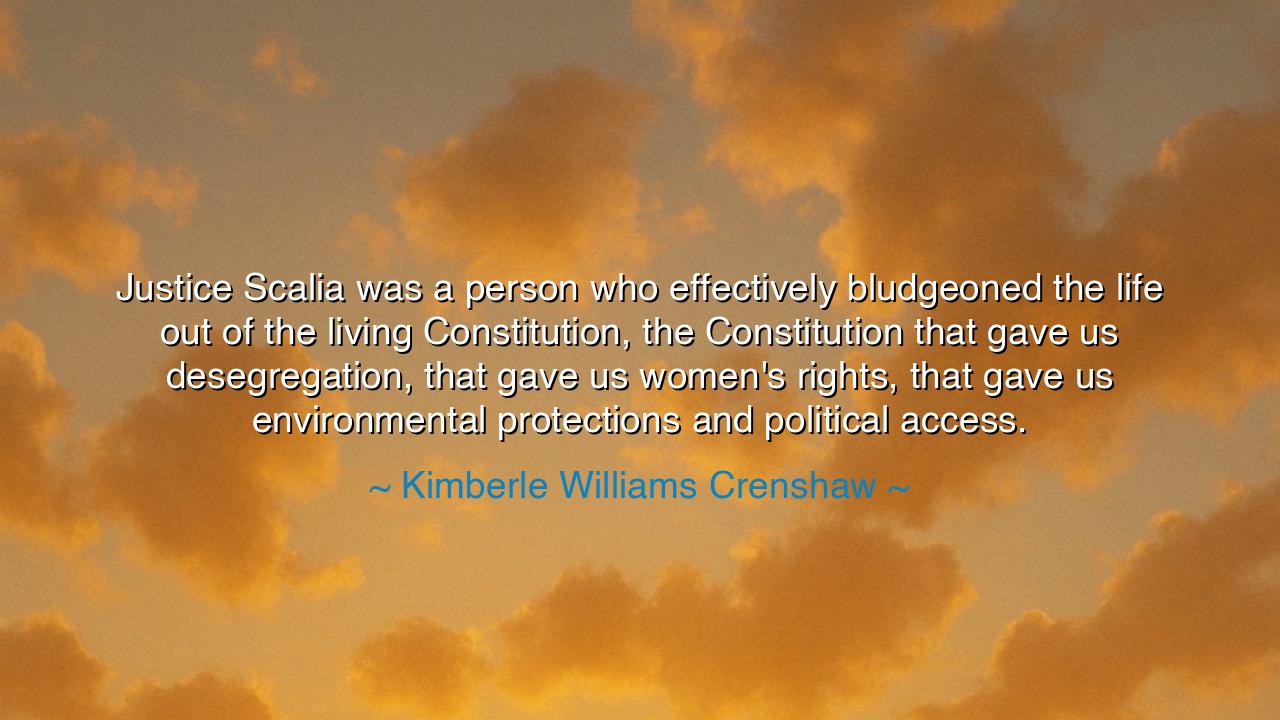
Justice Scalia was a person who effectively bludgeoned the life
Justice Scalia was a person who effectively bludgeoned the life out of the living Constitution, the Constitution that gave us desegregation, that gave us women's rights, that gave us environmental protections and political access.






Hear the words of Kimberlé Williams Crenshaw, spoken with fire and lament, as she gazed upon the legacy of a mighty jurist: “Justice Scalia was a person who effectively bludgeoned the life out of the living Constitution, the Constitution that gave us desegregation, that gave us women’s rights, that gave us environmental protections and political access.” These words are not mere criticism; they are a cry of grief for a vision of law that, in her eyes, had been strangled beneath the heavy hand of rigid interpretation.
The meaning of this quote lies in the clash between two great visions of the Constitution. One vision, held by Justice Antonin Scalia, was originalism—the belief that the Constitution must be bound to the meaning its authors intended at the time it was written. To Scalia, this anchored law in permanence and shielded it from the shifting tides of politics. But to Crenshaw, this was not a safeguard, but a cage. She believed in the living Constitution—an evolving document, capable of growth, expansion, and transformation, rising to meet the moral challenges of each generation. For her, the Constitution was not a fossil, but a tree, ever-living, whose branches stretched to offer shade and protection to new peoples and new struggles.
The origin of these words is rooted in the civil rights struggles of America. It was under the banner of the living Constitution that the Supreme Court, in Brown v. Board of Education (1954), declared segregation in schools unconstitutional. It was under that vision that women gained expanded protections in the workplace, that the environment found defenders in laws upheld by the courts, and that marginalized communities won access to political power. Crenshaw, herself a founder of critical race theory, saw in these victories the flowering of justice through interpretation that recognized the Constitution as a dynamic covenant, not a static relic.
History itself echoes this struggle. Recall the debates of the framers themselves. Even in 1787, men like Jefferson and Madison warned that a Constitution unadapted to changing times could become a ruin. Jefferson declared that laws and institutions must “keep pace with the progress of the human mind.” Yet others feared that too much change would dissolve stability. This eternal tension—between permanence and adaptability—runs through every republic. Crenshaw, in her quote, takes her stand firmly on the side of adaptability, mourning what she viewed as Scalia’s effort to bind the future to the chains of the past.
The lesson is not merely about Scalia, nor about Crenshaw, but about the nature of justice itself. If justice does not grow, it risks withering. A Constitution that cannot answer the cries of the oppressed, cannot extend its protection to the excluded, becomes to many not a shield but a wall. Yet a Constitution too easily reshaped risks losing its anchor, tossed by every wind of opinion. The challenge of every generation is to find the balance: to preserve the foundation while allowing the house of liberty to expand.
What then must we do? We must study both the spirit and the letter of the law. Honor the wisdom of those who framed the Constitution, yet also recognize that they could not foresee every injustice, every transformation of society. Defend the rights of those who seek inclusion, and press the law to live up to its highest ideals, not merely its narrowest words. Teach our children that the Constitution is not only a document to be read but a promise to be renewed, in every age, by every hand.
Thus, remember Kimberlé Williams Crenshaw’s words: “Justice Scalia bludgeoned the life out of the living Constitution.” Whether one agrees or not, the lesson endures—that liberty requires vigilance, that justice demands growth, and that the great charter of a nation must be both rooted and alive. Pass this wisdom on, that future generations may never mistake law as an idol carved in stone, but see it as a covenant, ever striving to include all within its protection. For only then does the Constitution fulfill its true destiny: not as parchment, but as living flame.






AAdministratorAdministrator
Welcome, honored guests. Please leave a comment, we will respond soon